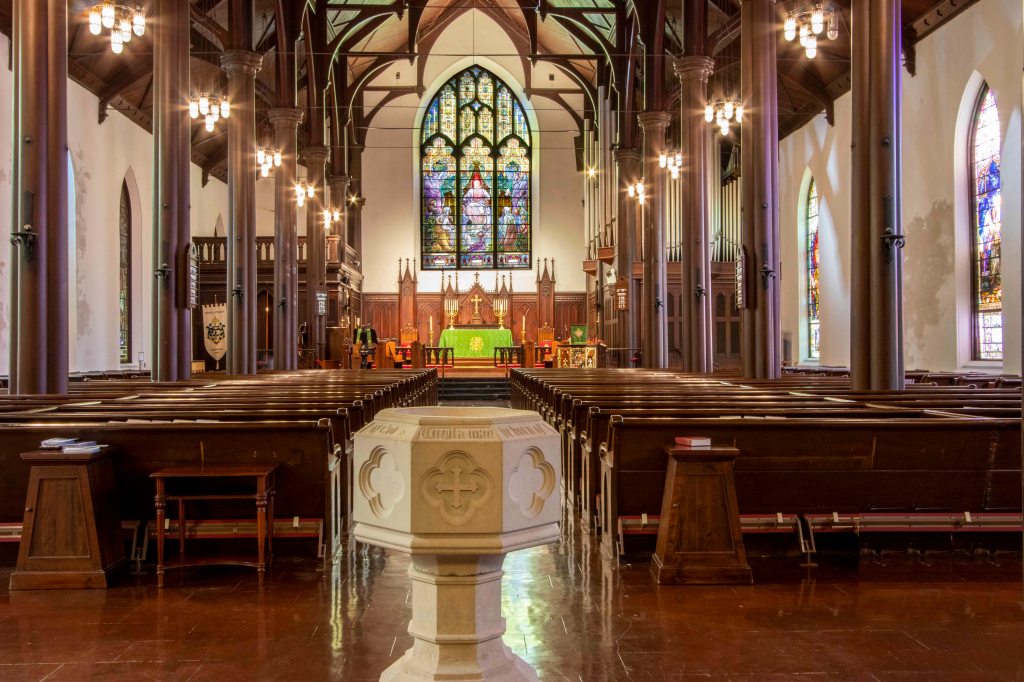Twelfth Sunday after Pentecost
August 28, 2022
Luke 14:1, 7-14
On one occasion Jesus was going to eat a meal in the house of a leader of the Pharisees. “When Jesus noticed how the guests chose the places of honor, he told them a parable” (Luke 14). The presumptuous choose for themselves the highest places and are moved down; the lowly choose for themselves the lowest places and are moved up. It’s one of the parables of Jesus that actually makes sense to us.
Because I see this played out all the time, especially at wedding receptions. You all know what it’s like trying to arrange the seating at a big family wedding. You need maps, charts, diagrams; you need cross-references of who can sit next to who and who can’t sit next to you. Uncle Phil and Cousin Joe have to be on separate sides of the ballroom. Aunt Sally and Grandma haven’t spoken for years. You have the head table with the bride and groom. You have the table for all the single people, you have the table for all the family friends that you hoped wouldn’t show up. I know this personally. Families really hope the priest doesn’t stick around for the wedding reception. No one wants to party with me standing there.
But seriously, this parable of Jesus makes sense because we have lived this parable. You’ve been invited to the box seats at the Astros and felt great. And you’ve been told to sit at the table of leftover guests and felt awkward.
So let’s dig one level deeper and ask that next question – why? Why do we care so much about where people sit? Why do we so carefully arrange our guests at charity galas? Why is where we sit the social calculation that it is? Why are we so concerned with how people perceive our social rank, our status?
I have a theory, and it’s going to be hard to hear. We Christians are so concerned with social status because most of the time we function as atheists. We Christians are so concerned with social status because most of the time, we function as atheists. I told you it was going to be hard to hear. But I consider my own life. Other than the fact that I work in a church, what separates me from my neighbor who doesn’t believe in God? Does my life look that much different from theirs? We live in the same neighborhood and are roughly in the same socioeconomic class. We both get up, get our kids to school, go to work, come home, cook dinner, do the laundry, take out the trash, watch a little Netflix, and go to bed. Wash, rinse, repeat the next day. So what separates me, a person who professes Jesus Christ as Lord, from my neighbor who doesn’t?
And what about you? Why do you care so much about what your neighbors think of you? Why do you get caught up in the social calculus of the dinner party? Why is it important that you live in that neighborhood, that you go to that restaurant, that your kids go to that school? Why do we care so much about the judgment of our neighbors instead of the judgment of God? Why do we, who profess Jesus Christ as Lord, function in the same way as our neighbors who have no gods but themselves?
This, I think, is one of the reasons that the world is so suspicious of the Church. Not because they look at us and see something different; but because they look at us and they see themselves. To our disgrace, all too often, the Church is simply a mirror to the world. We are just like them, so why in the world would they care to be one of us? If both Christians and non-Christians are competing for social status, working their way up the ladder, worrying about their perceived rank, well, why be a Christian? Why not just be an atheist and function as one as well? One important theologian is known for saying that the reason we don’t have any interesting atheists today is because we don’t have any interesting Christians (Stanley Hauerwas). The world knows it better than we do. For most of us most of the time, Christianity is a hobby.
As the Church and as individual followers of Jesus, we have to show the world we are different. We have to be interesting again. We must have a certain disregard for the social calculus of the world. I see it, and I think you do, too. And I’m going back to that uncomfortable question, why. Why. For instance, why do we keep buying bigger and bigger trucks? One truck is bigger than the next, and it all seems to be a show because I never see those trucks actually towing anything. Does it actually make you happy? Does that behemoth help you know Jesus? I see it, and I think you do, too. I see us keeping an eye on what other people wear, silently counting up how much it all must cost. Why? Has that ever made you happy? Has that posturing ever opened your heart to grace? Why are we all, who claim to be Christians, just like them?
I understand that this is a hard sermon to hear. And it is a hard sermon to preach, because I see myself all over it. Lord, have mercy. In the end, this sermon is probably just a meditation on my life. I want to be a Christian, I believe in the creeds, I say my prayers, but if I take a hard look at my life, more often than not I see a functional atheist. And so I pray every day – “Lord, save me from myself.”
But as this parable is a stern judge of our souls, it also shows us the way forward. Jesus said, “when you give a luncheon or a dinner, do not invite your friends or your brothers or your relatives or your rich neighbors, in case they may invite you in return, and you would be repaid. But when you give a banquet, invite the poor, the crippled, the lame, and the blind. And you will be blessed, because they cannot repay you, for you will be repaid at the resurrection of the righteous.” Now that’s an interesting faith.
This is how we will show the world that we are different. Out there, everything is a competition. That’s how the economy of the world works. But in Christ, it’s all gift. Everything is given away and nothing is expected in return. You want to turn some heads? You want to show the world that you are a Christian? You want to be interesting? When you give a banquet, invite the poor, the crippled, the lame, and the blind precisely because they cannot repay you. Throw a party and don’t expect even a single thank you note.
In other words, what should make a Christian so interesting is that we just don’t care. We don’t care if we are repaid, we don’t if we are categorized correctly, we don’t care if we’ll get anything back. We do for them, even when it is inconvenient, uncomfortable, or unsuitable to our tastes. This is one way to live as a Christian, and to show the world that you are different. To be interesting again.
Like Jesus was. Giving without expecting anything in return. Eating in the homes of the rich and the poor, talking to the wise and the foolish, healing the grateful and the ungrateful. You see it, right? This whole parable, this whole thing about humbling to become exalted, about giving without expecting anything; Jesus is describing himself. He never bought into the social pecking order but instead lowered himself to the point of death, even death on a cross. Everywhere he went he gathered the lost, the least, and the last. Even me, even you. Even when we don’t act like it. There, at the cross, there was no jockeying for position. There was no rank or class. There were no charts and diagrams about who matches with whom. Everybody matches with Jesus with his arms stretched wide open, he invited all of us, to join him in this great wedding banquet called the Church. Now that, that is an interesting faith.
I know it’s wildly inappropriate, but today I’m asking all of us to care a little bit less. To care less about what our neighbors will think of us, and to care more about what God will think of us.






Leave a comment